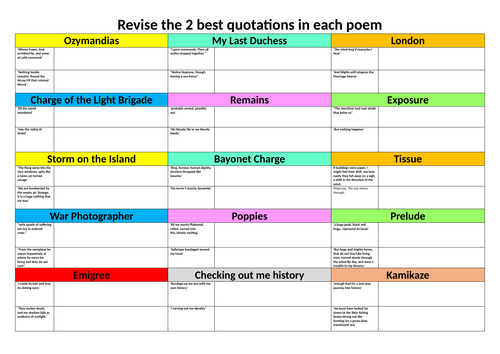387Uploads
93k+Views
52k+Downloads

Power and Conflict revising 3 Big Ideas in each poem
A lesson that revises 3 key big ideas related to power and/or conflict in each poem from the anthology.
Students then move to analyse how these big ideas are explored in 2 key quotations from each poem.
Suggested answers for both tasks are included.
My most comprehensive resource on Power and Conflict poetry is available here with revision posters on every poem:
https://www.tes.com/teaching-resource/power-and-conflict-revision-sheets-12884928

Power and Conflict 10 Model Responses
10 high grade Power and Conflict model responses covering a wide range of poems from the collection.
New: Includes a response to the May 2024 question when Kamikaze was the named poem.
My most comprehensive resource on Power and Conflict poetry is available here with revision posters on every poem:
https://www.tes.com/teaching-resource/power-and-conflict-revision-sheets-12884928

Scrooge Life Lessons May 2024 Grade 7-9 style model responses
3 different A Christmas Carol model responses exploring how Scrooge learns important life lessons across the novella. A similar type of question came up in the AQA May 2024 examination.
I included 3 different responses so it can be used to show different ways of approaching the question.
One response for example, analyses how each ghost imparts important life lessons to Scrooge.
Another response explores how Fred, Fezziwig, Tiny Tim and the Ghost of Christmas Yet to Come all act as mentors in facilitating Scrooge’s transformation. They have been written to meet the requirements for Band 5 and 6 on the mark scheme because they are consistently thoughtful with moments that could one could argue are perceptive in the way they meet the AOs… They may be useful for departmental moderation or for students considering about different ways of structuring their examination responses.

Paper 2 Question 5: National Service
A Paper 2 Question 5 focused lesson that asks students to give their views on the idea of teenagers completing compulsory national service.
Students read two sample responses - one primarily agrees with the statement and one primarily agrees. Then students complete their own response using the structure provided.
Extra time is spent looking at how to start off the article in a way that garners an emotional connection with the reader.

AQA Language Paper 2 Question 5 November 2022 Sleep and Sleeplessness
2 model responses for the AQA Paper 2 Question 5 on the November 2022 paper about sleep and sleeplessness. One letter primarily agrees with the statement while the other primarily disagrees with it.

Anger An Inspector Calls Grade 9 response
A grade 9 815 word response to the following question which was a question on the EdExcel 2022 paper:
In what ways is anger significant in An Inspector Calls?

An Inspector Calls May 24 Mrs Birling
A high level response on the character of Mrs Birling.
Also includes various support sheets and worksheets for analysing the character of Mrs Birling in depth.

Mrs Sybil Birling
Character revision sheet on Sybil Birling which analyses 10 key quotations. Also includes a thesis style introduction. Great revision tool for helping to prepare for writing an essay on this character.

Power and Conflict Quiz with Answers
Power and Conflict easy knowledge quiz. 6 rounds. 90 questions. Includes an answer sheet.
Also includes a second quiz with 10 multiple choice questions on every poem.

Animal Imagery Macbeth
Worksheet and revision sheet analysing 12 key quotations from Macbeth that employ animal imagery.

The Map - Woman Feminine Gospels
A detailed 26 slide PowerPoint which offers a comprehensive overview of The Map Woman. Includes discussion of big ideas, detailed annotations of all 13 stanzas, exemplar paragraphs, and extension tasks to consider the thematic similarities to other poems in the collection.

White Writing Feminine Gospels
A 21 slide introduction lesson to these two key poems from the Feminine Gospels about the ‘non-existent’ or ‘invisible’ female . Includes an engaging starter discussion, exploratory questions, links to Cixous, detailed annotations of both poems, exploratory questions and a research task.

Appositive Phrases in Romeo and Juliet
Using appositive phrases in your English literature responses will improve the sophistication of your writing. If used correctly, they will impress your examiner. Here are some examples on how to use appositive phrases when writing about the 6 main characters in Romeo and Juliet.

AQA Worlds and Lives Poetry Quiz
50 question quiz based on the Worlds and Lives AQA anthology. Comes with an answer sheet.

Romeo critical perspectives (A03)
Romeo critical perspectives to help students show a more thoughtful and perceptive understanding of Romeo’s character in Romeo and Juliet.

Macbeth 'Because, But, So' Thesis-style introductions
The ‘because, but, so’ method is an excellent tool for teaching students to think analytically about the literature texts. This tool is powerful because it encourages students to expand their thinking with precision and detail.
This resource collates 9 sample ‘because, but so’ thesis-style introductions to 9 themes that may come up in next year’s Macbeth examination.
Ideal as a revision tool for helping to guide the direction of essays.

Appositive Phrases in Macbeth
Using appositive phrases in your English literature responses will improve the sophistication of your writing. If used correctly, they will impress your examiner. Here are some examples on how to use appositive phrases when writing about the 6 main characters in Macbeth.

Themes in The Handmaid's Tale
Revision sheet analysing in detail 5 key quotations for 6 different themes/big ideas in The Handmaid’s Tale. 30 quotations in total. Ideal for exam preparation.
Bundle

Grade 9 An Inspector Calls responses
6 high grade (mostly grade 9) responses to a range of questions on An Inspector Calls.
Includes responses to the following:
Anger
Cruelty
Guilt
Women
Old versus Young
Chain of Events
Mrs Birling

Women in An Inspector Calls
A high grade response looking at how women are presented in An Inspector Calls. Not quite in top band. It requires a little more analysis of dramatic methods (A02) to reach the top band but the A03 is strong.























